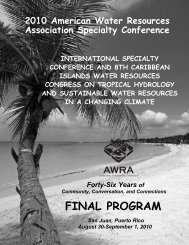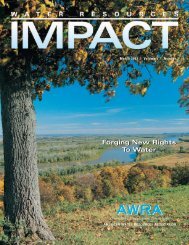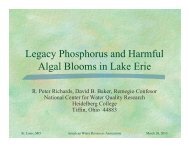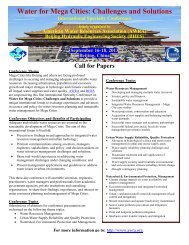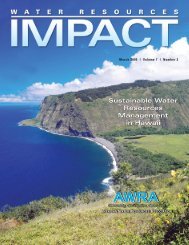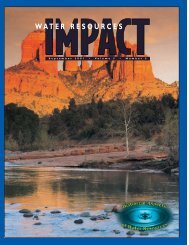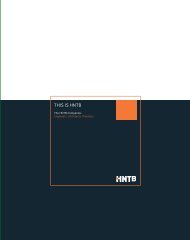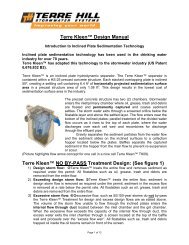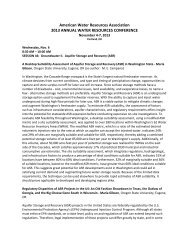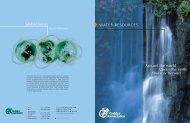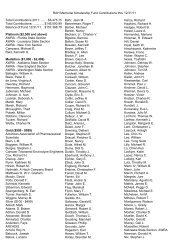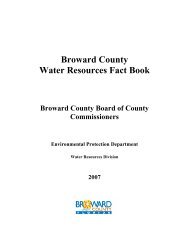N ovember 2 0 0 0 ⢠V olume 2 ⢠N umber 6 - American Water ...
N ovember 2 0 0 0 ⢠V olume 2 ⢠N umber 6 - American Water ...
N ovember 2 0 0 0 ⢠V olume 2 ⢠N umber 6 - American Water ...
You also want an ePaper? Increase the reach of your titles
YUMPU automatically turns print PDFs into web optimized ePapers that Google loves.
MTBE: The <strong>Water</strong>-Polluting Genie EPA Knowingly Let Out of the Bottle . . . . cont’d.<br />
line blended with MTBE. This example holds true for at<br />
least the 31 states where the chemical has been discovered<br />
in ground water.<br />
SOLUTION TO A NON-PROBLEM CREATES MORE<br />
The irony of MTBE polluting ground water is that neither<br />
it or any other oxygenate, including ethanol, produces<br />
any significant improvement in air quality, according<br />
to a study by the National Research Council.<br />
“Motor vehicle emissions of chemicals that form<br />
ozone have decreased in recent years,” said NRC committee<br />
chairman William Chiamides, Regents Professor of<br />
Earth and Atmospheric Sciences at the Georgia Institute<br />
of Technology (at the time of the report’s release). “But<br />
that’s largely because of better emissions control equipment<br />
and components of reformulated gasoline – other<br />
than oxygen additives – that improve air quality. Moreover,<br />
it is not possible to attribute any significant portion<br />
of past reductions in smog to the use of [oxygenates].”<br />
It was this improvement in engines that led State<br />
Representative Larry Julian, author of Michigan's MTBE<br />
ban, to thank the auto industry and auto workers for<br />
making the elimination of MTBE possible.<br />
In spite of the compelling reasons for ending the use<br />
of MTBE, doing so without removing the oxygenate mandate<br />
entirely could cause even higher gasoline prices and<br />
greater nationwide shortages of supply than those seen<br />
in the Midwest this summer. Without MTBE, ethanol<br />
would be the sole remaining major oxygenate. It currently<br />
cannot be produced in sufficient quantity for nationwide<br />
use. It cannot be transported through pipelines, as<br />
previously noted. And, it is more difficult to blend as<br />
demonstrated when EPA ordered new standards for<br />
ethanol blends in the Midwest last summer.<br />
In view of the National Research Council’s findings, it<br />
would seem prudent to phase out the use of oxygenates<br />
altogether, though this carries potential political problems<br />
for some politicians due to the pressure of the farm<br />
lobby. However, only Congress can change the federal<br />
mandate. As Julian said when the Michigan ban passed,<br />
perhaps the state’s measures will prompt the Congress to<br />
act.<br />
AUTHOR LINK<br />
E-MAIL<br />
Tom Randall<br />
Winningreen LLC<br />
3712 N Broadway - PMB 279<br />
Chicago, IL 60613<br />
(773) 549-7850<br />
Fax: (773) 549-3198 or (231) 869-8800<br />
E-Mail: trandall@winningreen.com<br />
Tom Randall is a senior partner with Winningreen LLC,<br />
an environmental policy consulting firm in Chicago, a<br />
freelance writer for such diverse publications as the<br />
Chicago Sun Times, Miami Herald, and Chicago Life magazine<br />
(a supplement to the Sunday New York Times). He<br />
has served as managing editor of Environment & Climate<br />
News and has testified before the U.S. Congress, as well<br />
as state legislatures, and is a frequent guest on talk<br />
radio.<br />
❖ ❖ ❖<br />
4 • <strong>Water</strong> Resources IMPACT N<strong>ovember</strong> • 2000



